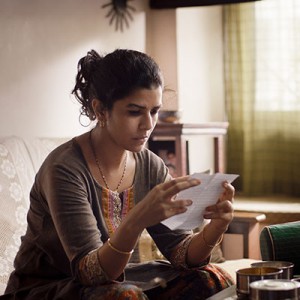film review: the lunchbox
Romantic comedies are not always the most interesting or unique of films, but every so often one comes along that stands out. The Lunchbox is one of these films. A feature film debut from writer and director Ritesh Batra, the movie has been nominated at several international festivals and won multiple awards, including the Critics Week Viewer’s Choice Award at Cannes in 2013. It is a story that is at once personal and universal, and it is no surprise that it has resonated with audiences across the world.
The film is based on a seemingly simple concept: a mis-delivered lunchbox. This accident, though, leads to an unlikely romance between Ila (Nimrat Kaur) and Sajaan (Irrfan Khan), two strangers who would have never made contact if not for the mix-up. Ila lives her with her husband and daughter in a small apartment in Mumbai; Sajaan lives across the city alone and is about to retire from his government job. Each day, Ila cooks lunch for her husband and sends it off via Mumbai’s ‘Dabbawala’ system, through which hot lunches are delivered to workers across the city via a remarkable coordination of bicycles, trains, and fast-working men (Dabbawalas). One day, Ila makes a special lunch following advice from her Auntie, in the hope that this particular dish will make her husband notice her again. Instead, he comes home and is just as distant and dismissive as usual. What could have gone wrong, Ila wonders?
It turns out that despite very slim odds, the lunchbox has been delivered to the wrong person: Sajaan. A grumpy and hostile man, Sajaan is clearly lonely after the death of his wife and seems to have given up on life. Until, of course, he receives Ila’s lunchbox. Not realising the mistake, he polishes off the lunch and sends back an empty lunchbox. Ila realises what has happened and the next day includes a note in her lunchbox for this stranger who seems to be a fan of her cooking. From then on, Ila and Sajaan exchange notes and the lunchbox, sharing their innermost thoughts with each other and each providing the other with solace and inspiration in the process. Both characters face major transitions and challenges in several areas of their lives: throughout, their letter writing is a way to share the burden.
The characters in The Lunchbox are both portrayed with skill and warmth. Ila is a strong woman who wants more for herself and her daughter than what her husband is providing her, and her relationship with Sajaan is certainly not a case of one simply rescuing the other: it is a two-way street, both characters find something they are missing in their writing to each other. Sajaan starts out rather gruff and stand-offish, but the lunches and letters from Ila seem to open his eyes and mind and remind him that perhaps he is not yet ready to give up on life.
The film is also inhabited by quirky and wonderful supporting characters. Ila’s Auntie (Bharati Achrekar), who calls out to Ila from the flat above and lowers chillies and spices in a basket out her window, is particularly memorable. Shaikh (Nawazuddin Siddiqui), Saajan’s would-be protégé who chops his veggies for dinner on the train ride home, is another great role.
The other major character in the film is undoubtedly the city of Mumbai. There are countless films set in iconic cities like New York, London and Paris, and these places make great backdrops for a variety of love stories, comedies and dramas. But a film set in Mumbai makes for a nice change of pace – the city is busy, colourful and overflowing with people, and it is fascinating to watch the lunchbox travel from Ila’s small apartment through a seemingly incredible but somehow successful system to reach Saajan’s desk. The system is famous for its precision, and the film cleverly plays with its supposedly flawless nature by centring the story on a case of mistaken lunchbox identity.
With a concept that instantly draws attention, The Lunchbox is worth seeing just for the window it provides into the Dabbawala system. But the people at either end of the lunchbox delivery are what makes this film truly moving: Ila and Sajaan are the type of characters that won’t be easily forgotten.


